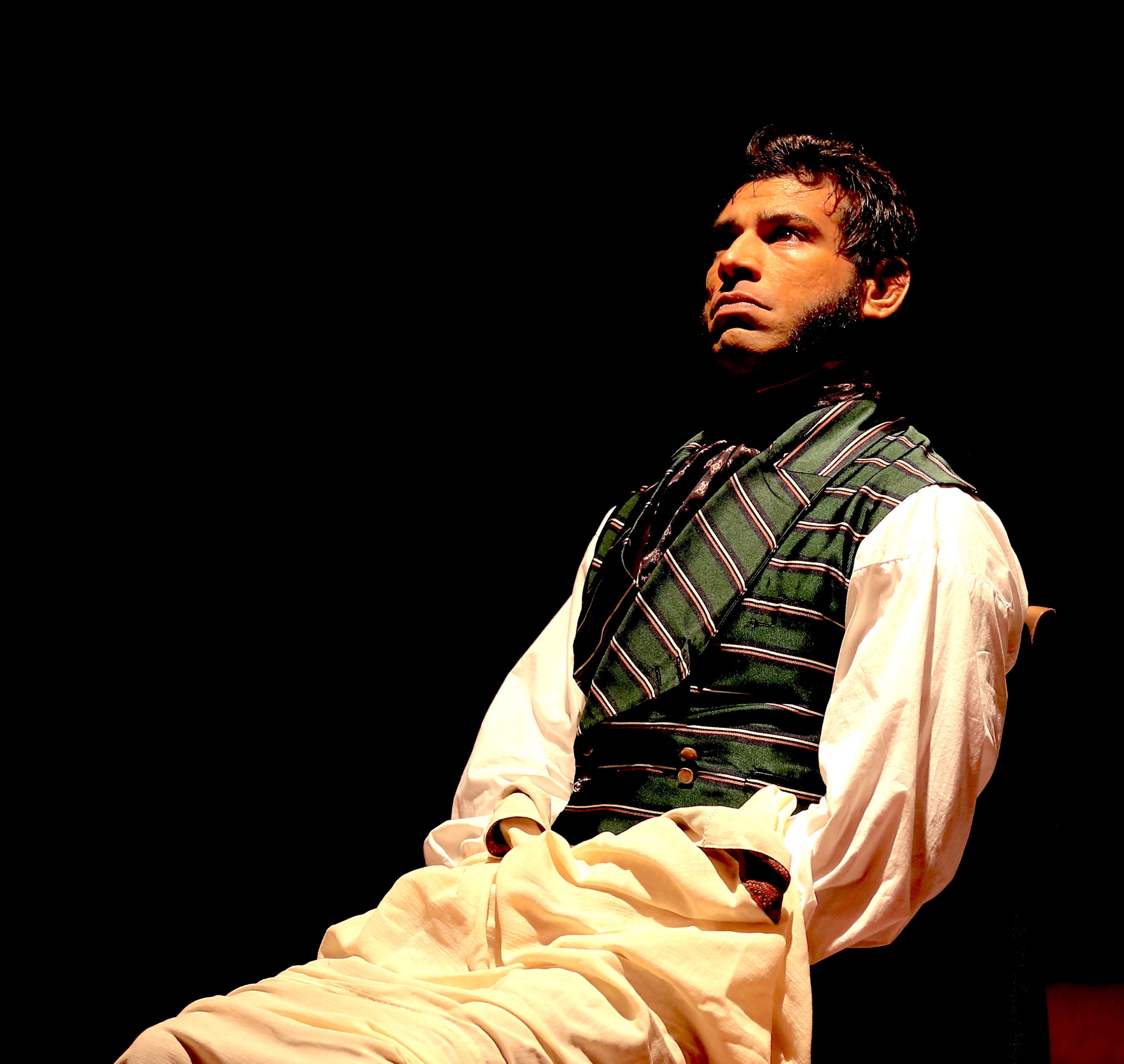TYRANNY AND TALENT
From right to left, the Shakespearean cast of Pushkin: Ian Lassiter as Pushkin with Jenny Leona as his wife Natalya. Gene Gillettte as Tsar Nicholas I. Christopher Kelly as Count D'Anthes with Tracy Sallows as Pushkin's mother-in-law, who doubles brilliantly as his housemaid. Lexi Lapp as Alexandra, Natalya's single older sister.
Jonathan Leaf's excellent new-old play Pushkin: A Life Played Out (playing Off Broadway's Sheen Center through 8/25) is an emotional rollercoaster in two parts. I say "new-old" because Leaf embarked on the work in 1999, but it's only now receiving its first production, directed by Christopher McEloren and with a cast worth waiting for.
Spanning the last four years in the life of Russia's greatest poet, Alexander Pushkin (1799-1837), Pushkin in an impassioned, historically detailed, heartbreaking study in the torments of tyranny, the abuse of art, and the real price of debt.
Pushkin's life changed overnight at the age of 15 when a poem he presented at school caught the attention of Derzhavin, a great eighteenth century poet. Perhaps it was instant stardom that showed Pushkin life as a game of chance; his later gambling addiction and readiness to duel are the behaviors of someone who views the future as out of his hands. Shortly after high school, Tsar Alexander I exiled the anti-serfdom writer on the publication of Ode to Liberty. Five years later, on the heels of the Decembrist revolt, the new emperor met with Pushkin and decided not to execute him. Tsar Nicholas I said that he hoped in time to end serfdom and Pushkin swore his loyalty.
This is the backdrop of Pushkin, a servant of two masters—his marriage under God to his wife Natalya, the stunning and convincing Jenny Leona, and his political marriage to Tsar Nicholas, a despot par excellence played by the potent Gene Gilette,
What power Pushkin had came from his popularity; the country was enamored of the author of Yevgeny Onegin, living for each installment. A masterwork eight years in the making that Pushkin would never quite complete, Onegin mirrors Pushkin's coming of age as he goes from idolizing Byron to Shakespeare, from the romanticism of youth to the disillusionment of middle age. See this exchange between grown-up Pushkin and his adoring young sister-in-law Alexandra (Lexi Lapp):
ALEXANDRA:
I know your lines by heart.
“I take a woman’s role – I’m Penelope -
And make my solitude my sovereign -
But could I briefly show what lies within -
As one who wishes to bend upon a knee,
To bend to you and part with self-control,
Though dreading laughs at showing you my soul.”
PUSHKIN:
I was young once. And I regret the error.
Pushkin is largely considered untranslatable for his layers of humor, contemporary reference and fusion of Old Slavonic with vernacular Russian. To serve his drama, Leaf has given us a play in original blank iambic pentameter verse, only directly quoting the poet once.
Matters are complicated when Natalya's older, unmarried sisters move in with her and Pushkin. The couple has glamorous contacts and the girls could benefit. While Pushkin and Natalya's marriage buckles under pressure, one sister Alexandra (a masterfully poetic Lacy Lapp) becomes his soulmate and the other Katarina (Olivia Gilliatt) falls for the dashing Frenchman, Count D'Anthes (Christopher Kelly), who has his eye on the increasingly unhappy Natalya. Foisted on their married sister and put in direct competition with each other, the girls' beauty is constantly rated by themselves and others. (Small wonder our legacy of senseless enmity between women.)
The Count woos an unhappily married woman.
Ian Lassiter as Pushkin communicated a Christ-like patience and dignity in the face of mounting stress. It was hard not to love and pity him. In Leaf's rendering of creative sessions between Pushkin and Tsar Nicholas, the poet's self-control intensified the baseness of autocracy. A Tsar gets whatever job he wants and as Russia's self-assigned Editor in Chief, Nicholas relished playing critic, making creative "suggestions" while censoring risky content. Pushkin boiled but didn't break and I felt my own sense of injustice rise. Greatest of all democratic rights may be our freedom to question, to criticize and to satirize authority. For anyone who has ever nodded to a lie, smiled at an insult, praised idiocy, Pushkin is a cathartic ride that acknowledges the pain of subservience. I had never so acutely imagined the plight of the artist in an oppressive regime.
In a particularly tense touch-base the Tsar edits Pushkin's latest effort:
NICHOLAS:
The brothel reference must go of course,
But more than that, the fourth line is no good.
You say there “saddle”; that’s not poetic.
“Mount”, “Pillion”: that’s poetry. Change that.
And “tease”? Why not instead call her a nymph?
PUSHKIN:
Yes, sire.
NICHOLAS:
You know we love your poetry.
It honors us, as sovereign, that you write it.
Agreed: there’s nothing that we can’t improve?
PUSHKIN:
Your taste is excellent, your majesty.
NICHOLAS:
Watch yourself, Pushkin. There’s a line you know.
PUSHKIN:
I was sincere. Did I sound sarcastic?
NICHOLAS:
We just remind you that it’s there.
While they may "win" in the short-run, people who have to point out their power don't really have it.
Leaf is an adroit builder of suspense and, as it turns out, romantic tragedy: Act II is a heartbreaker. In the last analysis Pushkin is a story of marriages gone wrong, of senseless wastes of love and life—by foolish people who mistake love for unattainability, by the Church and State who ruin everyone's fun.
Imprisoned by debt, responsible for four beloved children, his marriage dead and true love lost, Pushkin is over-eager to duel. His resultant death-bed speech had me bordering on sobs. If not the playwright's ultimate goal, I credit Leaf with creating a new play that uses the theatre like the Greeks intended—as a megaphone for the untranslatable emotions of human life.
Pushkin: A Life Played Out
The American Vicarious, Sheen Center for Thought and Culture, 18 Bleecker St.
$57, 866-811-4111, Performances Wed-Sun through August 25th
Read my review of Jonathan Leaf's The Fight, a revelatory showdown between '60s feminist royalty Gloria Steinem and Betty Friedan.




